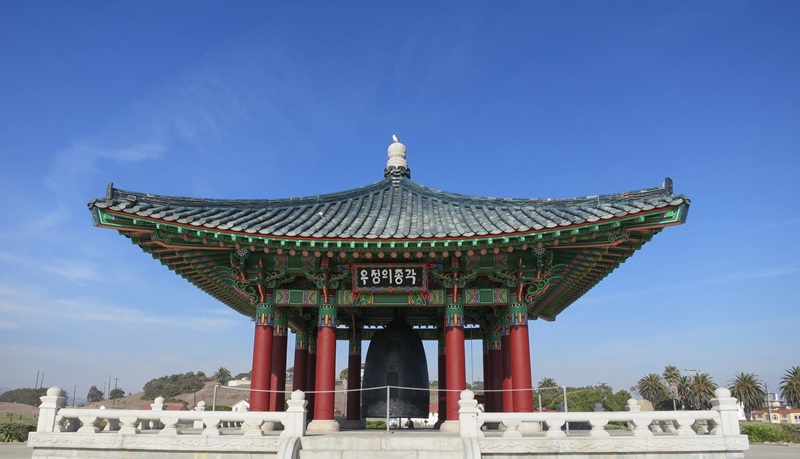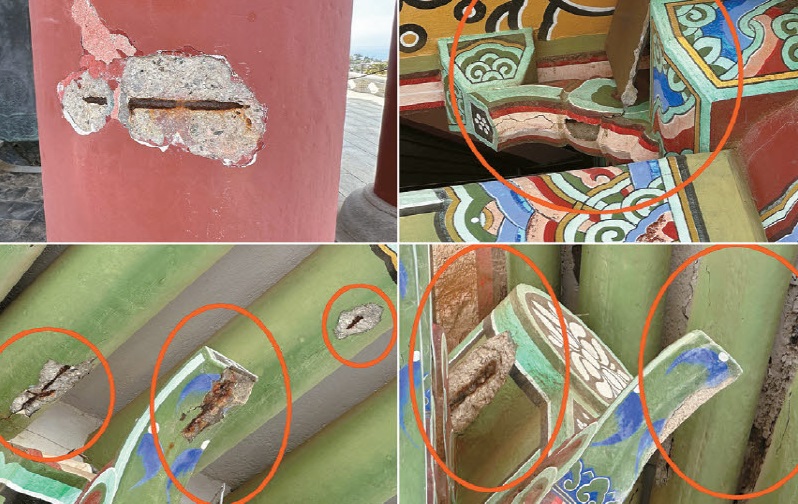Those who first see the magnificent Korean Friendship Bell, set against the backdrop of the San Pedro sea in southern LA, cannot help but be in awe. Modeled after Korea’s Emille Bell, the Friendship Bell, along with its entirely Korean-style bell pavilion, creates a striking scene set against the American landscape.
The Friendship Bell was a gift from the Korean government to the United States on July 4, 1976, marking the 200th anniversary of American independence. Situated atop a hill overlooking the Pacific Ocean, it is a notable landmark popular with tourists due to its stunning views and historical significance.
The LA Department of Recreation and Parks has announced plans to station professional guides at the Friendship Bell for the first time in 48 years to develop it as a tourist attraction. Starting the first Saturday in August, three staff members will provide official guide services to visitors.

The guide service, commencing on Saturday, August 3, will be available through both prior reservations and on-site visits. However, the department recommends making reservations in advance through the Angel’s Gate Recreation Center (310-548-7705) due to limited guide availability in case of high visitor turnout.
While the LA city government is bolstering efforts to preserve the Friendship Bell, the Korean organizations responsible for its preservation are embroiled in internal conflicts. The Korean Friendship Bell Preservation Committee, which has handled the bell’s maintenance, is now divided into two factions: the committee and the foundation. The two factions have been engaging in an internal conflict over who will lead the bell preservation mission.
Last October, the LA Department of Recreation and Parks ceased partnerships with both factions. Furthermore, the department excluded both groups from participating in the Independence Day bell-ringing ceremony held on July 4 this year.
Maintaining the Friendship Bell has been challenging due to its exposure to the sea breeze. The salt in the sea air rapidly corrodes the bell and its pavilion.
Before the internal conflicts within the Korean organization which takes care of the bell, local Koreans took pride in voluntarily caring for the Friendship Bell, recognizing it as a symbol of their heritage. In 1981, the “Friendship Bell Beautification Committee” was formed and served silently for over 25 years, gathering weekly to clean and maintain the bell.
In 2006, the various individuals and groups caring for the bell were consolidated into the “Korean Friendship Bell Preservation Committee.” The committee engaged actively with the LA Department of Recreation and Parks, local communities, and political figures to promote and manage the bell.
Despite its small size, the committee has operated under the mission of preserving Korean heritage, organizing up to five bell-ringing events annually.
Currently, the bell pavilion’s pillars have exposed rebar where cement has chipped away, the eaves’ dancheong (traditional Korean decorative coloring) has peeled off, and the pavilion’s floor is cracked.

The committee, built on the pure dedication and efforts of other Koreans for decades, has been neglecting its founding purpose of preserving the Friendship Bell due to an internecine feud.
Moreover, it is now time for major repairs again, just a decade after extensive work was completed in 2013. The tasks ahead include fundraising, securing experts, collaborating with the LA Department of Recreation and Parks, and recruiting volunteers.
As its name suggests, the Korean Friendship Bell Preservation Committee was established to preserve the Friendship Bell. Other Korean organizations have continued to support the committee during events and repair processes, expecting it to live up to its name.
The committee must reconsider its priorities, focusing on the values it should uphold, especially with the imminent preservation efforts. If the committee loses the Friendship Bell while engaging in internal fights for control, it will lose its raison d’être.
By Mooyoung Lee lee.mooyoung@koreadaily.com



![Green card interviews used as decoy for ICE arrests U.S. Immigration and Customs Enforcement (ICE) agents arrest a man after a hearing at an immigration court in Manhattan, New York, on Oct. 27. [REUTERS]](https://www.koreadailyus.com/wp-content/uploads/2025/12/1226-ICE-100x70.jpg)
